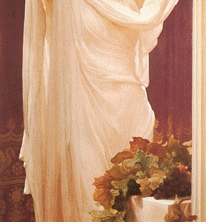
Publius Vergilius Maro was born on the 15th of October, 70 B.C.E., near Mantua. He is primarily known as the author of the Aeneid, the epic poem which links the birth of Rome to the Trojan war, and thus to the Homeric Cycle. The Aeneid is considered the pinnacle of classical Latin literature. His heroic and tragic characters such as Aeneas, and the Queen of Carthage, Dido, are memorable; the poetics of the Aeneid are exceptional, and the text has been used for generations to teach Latin. Two other minor works, the Eclogues (Pastorals) and the Georgics, have survived as well. This act of patriotic myth-building gained him the praise of the Emperor Augustus. He spent most of his life in Campania, near Sorrento and Posilipo; it is known that he also visited Greece briefly. Virgil does not show up in any contemporary accounts and he apparently had few intimate friendships. However, he was known as a virtuous and modest man, and although he gained vast public recognition during his lifetime, he is described as being embarrassed by his celebrity status on his rare visits to Rome. Unlike other poets such as Ovid, who wrote about intimate details of his personal life, Virgils' poetry was on topics of broad scale, from agriculture to nation building, so we know little about his internal life from his poems. Virgil died on September 21st, 19. B.C.E., at Brindisi, and his ashes were entombed near Naples in Posilipo. His tomb, which once was treated like a shrine, has disappeared. Supposedly his epitaph was Mantua me genuit; Calabri rapuere; tenet nunc Parthenope. Cecini pascua, rura, duces (Mantua gave birth to me, the Calabrians took me, now Naples holds me; I sang of pastures [the Eclogues], country [the Georgics] and leaders [the Aeneiad]). Virgil is widely acknowledged as a poetic genius. St. Augustine admired him, and Dante considered Virgil a primary inspiration for his own poetic world-building exercise; symbolically, Virgil is Dante's escort through the Inferno. Of course Aeneas made his own visit to the underworld... |
| On Twitter, follow 'sacredtexts.' |
| Sacred-texts on Facebook |
|
|
|
|
|
|
 Buy a mug. Support this site. |


![Aeneas flees burning Troy by Federico Barocci, 1598 [Public Domain Image]](aeneas.jpg)


